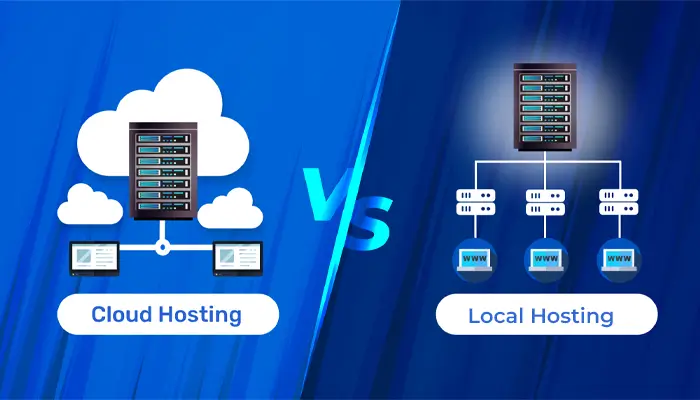
Digital Advertising in 2025: How Technology is Changing Paid Campaigns
September 18, 2025
The Future of Remote Work Tech: Essential Tools for Creative Teams in 2025
September 22, 2025Choosing the right hosting environment has a direct impact on your website’s speed, security and scalability. In 2025, businesses face two main choices: cloud hosting and local (traditional) hosting. While both options serve the same purpose keeping your website live the way they work and the benefits, they offer are very different.
Here’s a breakdown to help you decide which hosting solution is best for your business in 2025.
What is Local Hosting?
Local or traditional hosting stores your website on a single physical server, often in a data centre managed by a hosting provider.
- Common providers: Bluehost, HostGator, SiteGround.
- Types include shared, VPS and dedicated hosting.
- Offers straightforward, fixed-cost pricing.
Best for: Small websites with predictable traffic and lower budgets.
What is Cloud Hosting?
Cloud hosting distributes your website across a network of virtual servers, ensuring better uptime, scalability and performance.
- Providers: Amazon Web Services (AWS), Google Cloud, Microsoft Azure, DigitalOcean.
- Automatically balances traffic loads.
- Scales resources up or down on demand.
Best for: Businesses expecting growth, traffic spikes or global visitors.
Key Differences in 2025
- Performance & Speed
- Local Hosting: Performance depends on the server your site is on; can slow down during traffic surges.
- Cloud Hosting: Faster due to content delivery networks (CDNs) and load balancing.
- Scalability
- Local Hosting: Limited scalability, upgrading often means migrating to a new server.
- Cloud Hosting: Instantly scalable, perfect for growing e-commerce and global brands.
- Reliability & Uptime
- Local Hosting: Downtime risks if the physical server crashes.
- Cloud Hosting: High redundancy ensures near 100% uptime.
- Security
- Local Hosting: Standard protections but vulnerable to single-server attacks.
- Cloud Hosting: Enterprise-grade security, encryption and AI-driven threat monitoring.
- Cost
- Local Hosting: Cheaper upfront, predictable monthly fees.
- Cloud Hosting: Pay-as-you-go model; can be costlier if not managed well.

Conclusion
In 2025, cloud hosting is the preferred choice for businesses that need scalability, global reach and high uptime. Local hosting still works for smaller websites with limited traffic, but it lacks the flexibility and resilience that modern businesses demand.
If your brand relies heavily on digital presence whether for e-commerce, marketing or creative services cloud hosting is the future-proof option.
If you have any questions regarding “Cloud vs. Local Hosting” feel free to contact us. For inquiries and consultations, call us at: +92 321 4808303 or Email us at: hello@owaisgilani.com.
Disclaimer: The information shared on this website is for educational and informational purposes only and reflects my personal views and experiences. While I strive to provide accurate and helpful content, readers should use their own judgment and consult with a qualified professional before making any decisions based on the information here. I am not responsible for any actions taken based on this content. Feel free to reach out to me if you need clarification or have questions before using any part of this information.



